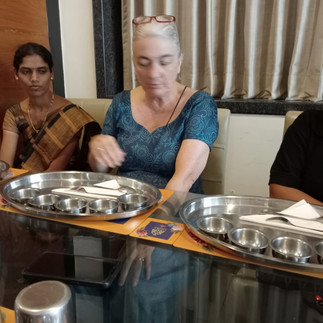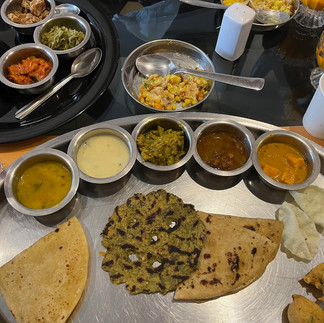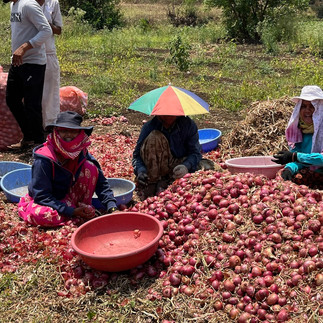"I cry to tell their story..."
- Anita Charles

- Apr 14, 2023
- 5 min read
I begin this post with a quick review of the play performances in Delhi. The theatre was small and historic, and we had a decent audience for both performances, about 80 in all. Here are a few photos. *The carved Ganesh is in the hall leading into the theatre. It's like a little shrine that people touch or say a quick prayer to. * The two photos of me holding up "posters" are special: The play is actually written about the man on the right (Rajeev Prakash Khare). He and his wife (on the left) are very talented artists. He works with calligraphy and she does a variety of fine arts. Prior to each show, they demonstrated their talents, and they each gave me a poster to keep. (The woman painted an image of Ganesh; the calligraphy is from a Hindi hymn about Lord Shri Ram and Hanuman and says, "Ready to do Ram's work".)
And here are some shots of FOOD, of course! The first two are during our rehearsal day in the playwright's apartment. The last two are of a special clay pot of biryani (delivered to the home) -- sealed in with colored flour that must be chipped away in order to get the food. It was the BEST biryani I have ever eaten! (And the customer gets to keep the clay pot. :-) ).
What I mostly want to focus on today, however, is an experience I had this past Wednesday. Do you recall the book launch? The author's wife (Bina) works for a corporation and coordinates their "social outreach" projects. All companies in India are required to spend at least 2% of their profits on "Corporate Social Responsibility" (CSR). Bina's company supports an NGO called YOJAK, Youth Organization for Joining, Action, and Knowledge. (See this link for more info.) YOJAK is also the Sanskrit word for "facilitator." YOJAK does extraordinary work with several thousand children and youth from (a) outlying rural tribal villages and (b) city slums (bastis). On Wednesday, I was given the opportunity to travel about 1.5 hours to some outlying tribal villages and visit a school as well as several families within their homes. While the pictures partly speak for themselves, there are some important details to note.
These families are among the poorest of the poor in the state of Maharashtra, and the rural tribal families are farmers who grow millets, corn, and a wide variety of other produce. In many instances, one or both parents have gone into the city for jobs as rickshaw drivers, cooks, housemaids, or other manual labor, leaving the children behind with grandparents. Alcoholism, domestic abuse, and child abuse are -- unfortunately -- not uncommon. (I was told stories that were devastating.) So YOJAK works with families to support the children and youth, keeping them in schools, offering counseling as needed, and more. The founder of YOJAK (a woman named Renu) and another staff member (Mathuri) told me stories of great suffering and extraordinary courage from these young people and families. The pressure for the girls to marry young (sometimes as young as 13) and the work-expectations within the family structure are both high, so the organization works particularly hard to help the girls stay in school.
This is not just an abstract point I am making here. I met girls who were walking 5+ miles each way to school every day -- barefoot. (I know this sounds like the classic cliche "joke" back home, which only makes this reality even more poignant as I witnessed it in real life...Trust me, this is no joke.) In fact, several were heading out to their villages after we met with them, and I commented on their lack of shoes for such a distance -- and in incredible 100-degree heat. The staff said this is just what they do -- that's how committed they are to getting to school. These girls' courage, resilience, fortitude, and work ethic put most of the rest of us to shame. We picked up a few girls to take with us to the village we were visiting.
Once in the villages, I met with several families. In one village near the school, the mother showed me the handicraft work she does to create figures and items out of plaster of paris. She INSISTED on giving me something, so I chose two very small items. Later, she had a wrapped package sent to me at the school. When I got home and opened it, I discovered that she had given me numerous handmade items. I was deeply moved. (I can't bring bigger items home, as they are too bulky, but I will find places to give them as gifts.)
We then went to another village where we met with several families, sitting on the ground just outside their homes. Two girls were the first of the YOJAK girls to make it all the way through 12th grade, AND the first from their village to do so! They were role models for the other girls in the village. Their dads were raising them. In one of these cases, the girl had been told to marry at the age of 15, and she outright refused and said she was staying in school and not getting married. Her dad supported her in this decision. (YOJAK says these types of cases are many, and there is only so much they can do in talking to the families. They know when they need to back off the pressure in order to keep their own standing and work within the community.)

We also met three slightly younger girls who were able to go to school through the YOJAK scholarships. These girls were being raised by their grandfather who began to tell us their story... the parents who were alcoholic and left to find work in the city, the suffering they had been through, and his commitment to these girls to get to school and have a future beyond the village if they choose to. At one point, he became silent and dropped his head down. Then he said quietly, "I cry to tell their story."

I get choked up even writing this now. These fathers and this grandfather were doing everything they could despite the harshest of circumstances, to ensure that these girls had options for their futures. I cannot begin to tell you how extraordinary this is, in a tribal village that historically has had very different realities for girls. But, as the grandfather himself said, times are changing, and the girls need to have options through education. These men are also important role models for their community.
If I had more time in India, I would volunteer with this organization. Perhaps there will be future opportunities to do so... On our way back, we stopped at a restaurant that serves "thali" dishes -- basically a big plate of a wide assortment of foods. Look at how much food there was! And I could have as much as I wanted of everything. My mouth is watering just looking at these photos.
One fun detail: As we headed to the villages, we passed many fields of crops. In one field, a group of people were harvesting onions. We stopped the car, and Mathuri and I got out to go see them up close (and Mathuri wanted to buy some of their onions). We climbed down into a ditch and up again, then out to where they were working in the unbearable heat. Everyone shared some laughter (even though I needed the jokes to be translated!), and they loved that we had stopped by.
And a last note about the HEAT... Well, more like a screenshot that speaks for itself. And... just because life is often an ambiguous paradox here in India, a photo of me enjoying piping-hot chai on one of these recent days.


































































This is such a moving post Anita. You do a beautiful job of painting a picture of the contrasts between poverty, love, sadness, hope, joy and pain. And your pictures always help to till in the gaps for me. Thank you for being an ambassador for education and peace and for spreading the word that regardless of whether or not we are there to witness it, the poverty and despair still exist. You are one of my heroes and your courage is inspiring. I am sending you love and strength. Anne Kennedy
I am so glad Anita was in the play, as that's the reason I went to watch a play, after ages. And Anita was so good in it.
I was bowled over by the young writer of the play, Shubhra Prakash, who also played a leading role in the play, for her visualization and composition of such a monumental play. Kudos to all the participation.
The narration about the lives of the villagers, the struggles of the young girls and the hardships they bear with, are all so touching and so hard hitting. And yet so wonderful that times now are so much better for the brave young girls, than ever before. Surely, their future lives will be brighter.
Good…
Thank you Anita for being part of the play 🙏🏽